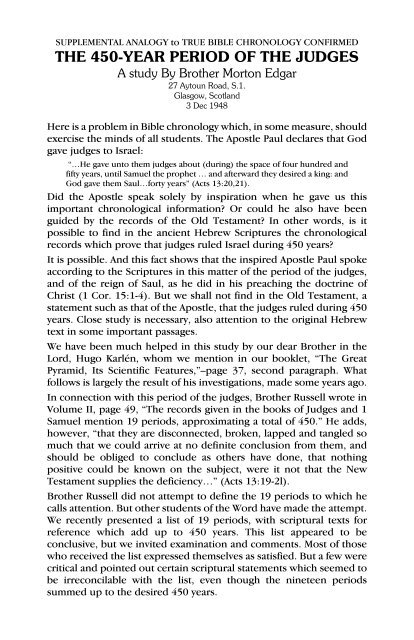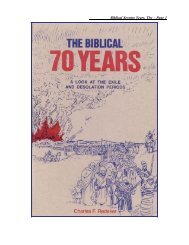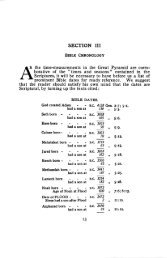The 450-Year Period of the Judges - Bible Student Chronology
The 450-Year Period of the Judges - Bible Student Chronology
The 450-Year Period of the Judges - Bible Student Chronology
Create successful ePaper yourself
Turn your PDF publications into a flip-book with our unique Google optimized e-Paper software.
SUPPLEMENTAL ANALOGY to TRUE BIBLE CHRONOLOGY CONFIRMEDTHE <strong>450</strong>-YEAR PERIOD OF THE JUDGESA study By Bro<strong>the</strong>r Morton Edgar27 Aytoun Road, S.1.Glasgow, Scotland3 Dec 1948Here is a problem in <strong>Bible</strong> chronology which, in some measure, shouldexercise <strong>the</strong> minds <strong>of</strong> all students. <strong>The</strong> Apostle Paul declares that Godgave judges to Israel:“…He gave unto <strong>the</strong>m judges about (during) <strong>the</strong> space <strong>of</strong> four hundred andfifty years, until Samuel <strong>the</strong> prophet … and afterward <strong>the</strong>y desired a king: andGod gave <strong>the</strong>m Saul…forty years” (Acts 13:20,21).Did <strong>the</strong> Apostle speak solely by inspiration when he gave us thisimportant chronological information? Or could he also have beenguided by <strong>the</strong> records <strong>of</strong> <strong>the</strong> Old Testament? In o<strong>the</strong>r words, is itpossible to find in <strong>the</strong> ancient Hebrew Scriptures <strong>the</strong> chronologicalrecords which prove that judges ruled Israel during <strong>450</strong> years?It is possible. And this fact shows that <strong>the</strong> inspired Apostle Paul spokeaccording to <strong>the</strong> Scriptures in this matter <strong>of</strong> <strong>the</strong> period <strong>of</strong> <strong>the</strong> judges,and <strong>of</strong> <strong>the</strong> reign <strong>of</strong> Saul, as he did in his preaching <strong>the</strong> doctrine <strong>of</strong>Christ (1 Cor. 15:1-4). But we shall not find in <strong>the</strong> Old Testament, astatement such as that <strong>of</strong> <strong>the</strong> Apostle, that <strong>the</strong> judges ruled during <strong>450</strong>years. Close study is necessary, also attention to <strong>the</strong> original Hebrewtext in some important passages.We have been much helped in this study by our dear Bro<strong>the</strong>r in <strong>the</strong>Lord, Hugo Karlén, whom we mention in our booklet, “<strong>The</strong> GreatPyramid, Its Scientific Features,”–page 37, second paragraph. Whatfollows is largely <strong>the</strong> result <strong>of</strong> his investigations, made some years ago.In connection with this period <strong>of</strong> <strong>the</strong> judges, Bro<strong>the</strong>r Russell wrote inVolume II, page 49, “<strong>The</strong> records given in <strong>the</strong> books <strong>of</strong> <strong>Judges</strong> and 1Samuel mention 19 periods, approximating a total <strong>of</strong> <strong>450</strong>.” He adds,however, “that <strong>the</strong>y are disconnected, broken, lapped and tangled somuch that we could arrive at no definite conclusion from <strong>the</strong>m, andshould be obliged to conclude as o<strong>the</strong>rs have done, that nothingpositive could be known on <strong>the</strong> subject, were it not that <strong>the</strong> NewTestament supplies <strong>the</strong> deficiency…” (Acts 13:19-2l).Bro<strong>the</strong>r Russell did not attempt to define <strong>the</strong> 19 periods to which hecalls attention. But o<strong>the</strong>r students <strong>of</strong> <strong>the</strong> Word have made <strong>the</strong> attempt.We recently presented a list <strong>of</strong> 19 periods, with scriptural texts forreference which add up to <strong>450</strong> years. This list appeared to beconclusive, but we invited examination and comments. Most <strong>of</strong> thosewho received <strong>the</strong> list expressed <strong>the</strong>mselves as satisfied. But a few werecritical and pointed out certain scriptural statements which seemed tobe irreconcilable with <strong>the</strong> list, even though <strong>the</strong> nineteen periodssummed up to <strong>the</strong> desired <strong>450</strong> years.
174<strong>The</strong> <strong>Period</strong> <strong>of</strong> <strong>the</strong> <strong>Judges</strong>Let us repeat <strong>the</strong> list as given, and <strong>the</strong>n we can consider <strong>the</strong>irreconcilable Scriptures referred to:<strong>Period</strong> <strong>Year</strong>s <strong>Period</strong> Identity Scripture Reference1 8 Servitude to Mesopotamia <strong>Judges</strong> 3:82 40 <strong>Judges</strong>hip <strong>of</strong> Othniel “ 3:9-113 18 Servitude to Moab “ 3:144 80 Rest under Ehud “ 3:15-305 20 Servitude to Jabin “ 4:1-36 40 Rest under Deborah “ 5:317 7 Bondage under Midian “ 6:18 40 Rest under Gideon “ 8:289 3 Reign <strong>of</strong> Abimelech “ 9:1-2210 23 <strong>Judges</strong>hip <strong>of</strong> Tola “ 10:1,211 22 <strong>Judges</strong>hip <strong>of</strong> Jair “ 10:3301 (sub-total) <strong>Judges</strong> 11:2612 18 Oppression <strong>of</strong> Ammon “ 10:813 6 <strong>Judges</strong>hip <strong>of</strong> Jephthah “ 12:714 7 <strong>Judges</strong>hip <strong>of</strong> Ibzan “ 12:8,915 10 <strong>Judges</strong>hip <strong>of</strong> Elon “ 12:10,1116 8 <strong>Judges</strong>hip <strong>of</strong> Abdon “ 12:12-1517* 40 Oppression <strong>of</strong> Philistines “ 13:118 40 <strong>Judges</strong>hip <strong>of</strong> Eli 1Sam. 4:12-1819** 20 <strong>Judges</strong>hip <strong>of</strong> Samuel “ 8:5<strong>450</strong> TOTAL Acts 13:20,21NOTES:* During <strong>the</strong> last 20 <strong>of</strong> this 40 years Samson judges Israel ... <strong>Judges</strong> 15:20; 16:30-31.** Until Israel asked for a king. It was during Samuel’s judgeship that <strong>the</strong> arkremained in Kirjath-jearim...1 Sam 7:2<strong>The</strong> above nineteen periods appear to be <strong>the</strong> identical list whichBro<strong>the</strong>r Russell had in mind when he wrote page 49 <strong>of</strong> his 2nd volume<strong>of</strong> “Studies in <strong>the</strong> Scriptures.” Never<strong>the</strong>less, we can quote Scriptureswhich prove that <strong>the</strong> list cannot be accepted as it stands.For instance <strong>the</strong> 8 years <strong>of</strong> servitude to Mesopotamia is <strong>the</strong> first period<strong>of</strong> <strong>the</strong> list. But a punishment <strong>of</strong> servitude could not follow immediatelyafter <strong>the</strong> end <strong>of</strong> <strong>the</strong> wilderness journey when Joshua led <strong>the</strong> people into<strong>the</strong> land <strong>of</strong> promise. For <strong>the</strong> Scripture declares:“And <strong>the</strong> people served <strong>the</strong> LORD (not <strong>the</strong> king <strong>of</strong> Mesopotamia) all <strong>the</strong> days <strong>of</strong>Joshua, and all <strong>the</strong> days <strong>of</strong> <strong>the</strong> elders that outlived Joshua, who had seen all <strong>the</strong>great works <strong>of</strong> <strong>the</strong> LORD, that he did for Israel” (<strong>Judges</strong> 2:7).
176<strong>The</strong> <strong>Period</strong> <strong>of</strong> <strong>the</strong> <strong>Judges</strong>First, let us reckon backward: From <strong>the</strong> list on page 2, we note that Jairjudged Israel for 22 years, and Tola before him for 23 years. Abimelechhad a brief reign <strong>of</strong> 3 years, after Israel had enjoyed a rest <strong>of</strong> 40 yearsunder Gideon. Before Gideon’s deliverance, Israel had sufferedbondage to Midian for a period <strong>of</strong> 7 years. <strong>The</strong>se five periods total 95years, and all are easily to be followed in <strong>the</strong> scriptural record.But <strong>the</strong> preceding times <strong>of</strong> Deborah, Jabin, and Ehud call for carefulconsideration. For it was a mistake to assume that 80 years referred toin <strong>Judges</strong> 3:30 were entirely under <strong>the</strong> deliverer Ehud. Ehud deliveredIsrael after <strong>the</strong>ir 18 years servitude to Moab (<strong>Judges</strong> 3:14-29). But <strong>the</strong>Scriptures nei<strong>the</strong>r say nor imply that <strong>the</strong> 80 years rest which <strong>the</strong> land<strong>the</strong>n enjoyed were all under <strong>the</strong> deliverer Ehud. <strong>The</strong> judgeship <strong>of</strong>Shamgar who followed on <strong>the</strong> death <strong>of</strong> Ehud, and <strong>of</strong> Deborah <strong>the</strong>prophetess who judged after Shamgar, are included in this 80 yearperiod. Also, <strong>the</strong> oppressor Jabin, with his captain Sisera, wereconquered within this time period.<strong>The</strong> Philistines tried to break <strong>the</strong> rest which Ehud had won for <strong>the</strong> land,but <strong>the</strong>y were immediately overthrown by Shamgar (<strong>Judges</strong> 3:31).<strong>The</strong> “20 years” spoken <strong>of</strong> in <strong>Judges</strong> 4:3 can also be read “twentieth”year, according to <strong>the</strong> Hebrew original, for <strong>the</strong>re are no ordinals in <strong>the</strong>Hebrew above 10, and <strong>the</strong> context and <strong>the</strong> sense <strong>of</strong> <strong>the</strong> passage mustdetermine which is correct in any particular text. (Ordinals are: first,second, third, etc. Cardinals are: one, two, three).After <strong>the</strong> death <strong>of</strong> Ehud, during <strong>the</strong> time <strong>of</strong> Shamgar, <strong>the</strong> children <strong>of</strong>Israel again did evil in <strong>the</strong> Lord’s sight (<strong>Judges</strong> 4:1), and in punishment“<strong>the</strong> LORD sold <strong>the</strong>m into <strong>the</strong> hand <strong>of</strong> Jabin, king <strong>of</strong> Canaan, thatreigned in Hazor. <strong>The</strong> captain <strong>of</strong> his host was Sisera, which dwelt inHarosheth <strong>of</strong> <strong>the</strong> Gentiles. And <strong>the</strong> children <strong>of</strong> Israel cried unto <strong>the</strong>LORD for he had nine hundred chariots <strong>of</strong> iron, and twenty years hemightily oppressed <strong>the</strong> children <strong>of</strong> Israel” (<strong>Judges</strong> 4:1-3).But as we pointed out, we can read: “and in <strong>the</strong> twentieth year he(Jabin) mightily oppressed <strong>the</strong> children <strong>of</strong> Israel.” (<strong>Judges</strong> 4:1-3).It was in <strong>the</strong> twentieth, and <strong>the</strong> last, year <strong>of</strong> Shamgar that Jabinoppressed Israel. <strong>The</strong> Hebrew <strong>of</strong> <strong>the</strong> word translated “oppressed” inthis text does not necessarily imply that Jabin subjected Israel, butra<strong>the</strong>r, that he troubled <strong>the</strong>m, and this in <strong>the</strong> nor<strong>the</strong>rn part <strong>of</strong> <strong>the</strong>country only. (See marginal note <strong>of</strong> <strong>Judges</strong> 4:2).Shamgar, as a judge, appeared not to have exercised complete control<strong>of</strong> <strong>the</strong> land, and thus we read: “In <strong>the</strong> days <strong>of</strong> Shamgar <strong>the</strong> son <strong>of</strong> Anath,in <strong>the</strong> days <strong>of</strong> Jael, <strong>the</strong> highways were unoccupied, and <strong>the</strong> travellerswalked through byways (or ‘crooked ways’)” (<strong>Judges</strong> 5:6, marginalreading). Although <strong>the</strong> land had rest during this time (no active wars),yet, owing to <strong>the</strong> weakness <strong>of</strong> Judge Shamgar, <strong>the</strong>re was a feeling <strong>of</strong>insecurity – <strong>the</strong> people were afraid to walk openly along <strong>the</strong> highways.
178<strong>The</strong> <strong>Period</strong> <strong>of</strong> <strong>the</strong> <strong>Judges</strong>“<strong>The</strong> anger <strong>of</strong> <strong>the</strong> LORD was hot against Israel, and he sold <strong>the</strong>m into <strong>the</strong> hands<strong>of</strong> <strong>the</strong> Philistines, and into <strong>the</strong> hands <strong>of</strong> <strong>the</strong> children <strong>of</strong> Ammon. And that year<strong>the</strong>y vexed and oppressed <strong>the</strong> children <strong>of</strong> Israel: eighteen years, all <strong>the</strong> children<strong>of</strong> Israel that were on <strong>the</strong> o<strong>the</strong>r side Jordan in <strong>the</strong> land <strong>of</strong> <strong>the</strong> Amorites, whichis in Gilead. Moreover <strong>the</strong> children <strong>of</strong> Ammon passed over Jordan to fight alsoagainst Judah, and against Benjamin, and against <strong>the</strong> house <strong>of</strong> Ephraim; so thatIsrael was sore distressed.” (<strong>Judges</strong> 10:7-9)It is pointed out that <strong>the</strong> above English translation does not convey <strong>the</strong>meaning <strong>of</strong> <strong>the</strong> Hebrew original. One can see that, as it stands, <strong>the</strong>English text requires some explanation: “that year … eighteen years…”.<strong>The</strong> word “eighteen” should properly be rendered “eighteenth,” to get<strong>the</strong> true sense <strong>of</strong> <strong>the</strong> passage. This is determined by <strong>the</strong> context. <strong>The</strong>correct translation is:“And that year <strong>the</strong>y (<strong>the</strong> Ammonites) vexed and crushed <strong>the</strong> children <strong>of</strong> Israelin this, <strong>the</strong> 18 th year.”Note also that <strong>the</strong> word “oppressed” is, in <strong>the</strong> marginal reading,“crushed,” which is a truer translation <strong>of</strong> <strong>the</strong> Hebrew word, andsuggests a different thought.<strong>The</strong> Ammonites did not succeed in dominating Israel as a whole. <strong>The</strong>ytroubled and vexed part <strong>of</strong> Israel for 17 years, during <strong>the</strong> time <strong>of</strong> Jair’sjudgeship. But that year, when Jair died, which was <strong>the</strong> eighteenth year<strong>of</strong> <strong>the</strong>ir hostility to Israel, <strong>the</strong>y thought now that Judge Jair was removedin death, <strong>the</strong>y would easily have success in dominating <strong>the</strong> whole <strong>of</strong>Israel. And accordingly <strong>the</strong>y attacked Israel dreadfully, crushingly. But<strong>the</strong>y were stopped and defeated by Jephthah, “a mighty man <strong>of</strong> valour”(<strong>Judges</strong> 11:1).And in <strong>the</strong> 11th chapter <strong>of</strong> <strong>Judges</strong> we read how Jephthah was made <strong>the</strong>leader <strong>of</strong> Israel, and how <strong>the</strong> Lord delivered <strong>the</strong> children <strong>of</strong> Ammon intohis hands:“He smote <strong>the</strong>m from Aroer,… with a very great slaughter. Thus <strong>the</strong> children<strong>of</strong> Ammon were subdued before <strong>the</strong> children <strong>of</strong> Israel.” (<strong>Judges</strong> 11:32-33).<strong>The</strong>refore we are not to reckon on a period <strong>of</strong> 18 years oppression from<strong>the</strong> time <strong>of</strong> Jair’s death. <strong>The</strong> Ammonites did not crush Israel for 18years, but ra<strong>the</strong>r it was in <strong>the</strong> 18 th year <strong>of</strong> <strong>the</strong>ir trouble-making that <strong>the</strong>ycrushed Israel, thus calling forth that special effort <strong>of</strong> Israel underJephthah which defeated and subdued <strong>the</strong>m.<strong>The</strong> 6 years <strong>of</strong> Jephthah’s judgeship began at <strong>the</strong> death <strong>of</strong> Jair, <strong>the</strong> end<strong>of</strong> <strong>the</strong> 300 years spoken <strong>of</strong> by Jephthah (<strong>Judges</strong> 11:26). From this timepoint we now count forward in Israel’s history to <strong>the</strong> time <strong>of</strong> Samuel’sjudgeship, and his anointing <strong>of</strong> Saul as king.Ibzan followed Jephthah and judged Israel 7 years. <strong>The</strong>n Elon judgedfor 10 years, and Abdon for 8. <strong>The</strong> 40 years oppression <strong>of</strong> <strong>the</strong> Philistinesfollowed on <strong>the</strong> last 20 <strong>of</strong> which Samson judged Israel (<strong>Judges</strong> 13:1;15:20; 16:30-31). Eli followed with a judgeship <strong>of</strong> 40 years (1 Samuel4:12-18). Finally, <strong>the</strong> prophet Samuel acted as judge until <strong>the</strong> peopleasked for a king, and God gave <strong>the</strong>m Saul.
<strong>The</strong> <strong>Period</strong> <strong>of</strong> <strong>the</strong> <strong>Judges</strong> 179In <strong>the</strong> list <strong>of</strong> 19 periods (see page 2), Samuel is entered as havingjudged Israel for 20 years, on <strong>the</strong> assumption that <strong>the</strong> 20 years spoken<strong>of</strong> in 1 Samuel 7:2 had reference to <strong>the</strong> duration <strong>of</strong> Samuel’s judgeship.But 1 Samuel 7:2 does not state that Samuel judged Israel for 20 years.<strong>The</strong> Scriptures show that up to <strong>the</strong> time when Saul was anointed to beking <strong>of</strong> Israel, Samuel must have acted as judge much longer than 20years.Ferrar Fenton says 45 years, while o<strong>the</strong>r chronologers, reckon Samuel’sjudgeship to have been between 40 and 50 years. <strong>The</strong> Scriptures showthat Samuel was a child at <strong>the</strong> time when Eli’s eyes began to wax dimfor age (1 Samuel 3:1-2). But Samuel is said to be old and gray headedwhen he anointed Saul as king (1 Samuel 12:1-2). This implies aconsiderable number <strong>of</strong> years between <strong>the</strong> death <strong>of</strong> Eli when Samuelreplaced him as judge and his anointing <strong>of</strong> Saul (see also 1 Samuel8:1-5; 12:2).When we take <strong>the</strong> literal translation <strong>of</strong> <strong>the</strong> Hebrew <strong>of</strong> 1 Samuel 7:2, weread:“And it came to pass from <strong>the</strong> time <strong>the</strong> ark remained in Kirjath-jearim, that <strong>the</strong>days were multiplied, and it was <strong>the</strong> 20th year and all <strong>the</strong> house <strong>of</strong> Israellamented after <strong>the</strong> LORD,” or “assembled before <strong>the</strong> LORD.”In <strong>the</strong> Latin Vulgate [<strong>the</strong>] translation reads: “…it was now <strong>the</strong> 20thyear.”Most translators and commentators consider that <strong>the</strong> Philistines, after<strong>the</strong> death <strong>of</strong> Eli, continued to have a certain power over Israel during20 years. In <strong>the</strong> meantime, however, Samuel was judge in Israel.But in <strong>the</strong> 20 years from <strong>the</strong> arrival <strong>of</strong> <strong>the</strong> ark in Kirjath-jearim, Israelhad enough <strong>of</strong> <strong>the</strong> Philistines oppressive power and had turned to <strong>the</strong>Lord for help. We read that Samuel prayed to <strong>the</strong> Lord on behalf <strong>of</strong> <strong>the</strong>children <strong>of</strong> Israel in <strong>the</strong>ir distress, after admonishing <strong>the</strong>m to“…put away <strong>the</strong> strange gods and Ashtaroth from among you, and prepare yourhearts unto <strong>the</strong> LORD, and serve him only: and he will deliver you out <strong>of</strong> <strong>the</strong>hand <strong>of</strong> <strong>the</strong> Philistines.” (1 Samuel 7:3).When <strong>the</strong> Philistines sought to do battle against <strong>the</strong> now repentantchildren <strong>of</strong> Israel, <strong>the</strong> Lord “…thundered with a great thunder on thatday upon <strong>the</strong> Philistines, and discomfited <strong>the</strong>m; and <strong>the</strong>y were smittenbefore Israel… So <strong>the</strong> Philistines were subdued, and <strong>the</strong>y came no moreunto <strong>the</strong> coast <strong>of</strong> Israel…” (1 Samuel 7:4-15).After <strong>the</strong>se 20 years, in <strong>the</strong> last <strong>of</strong> which <strong>the</strong> Philistines were finallysubdued, Samuel judged Israel for 25 years until he anointed Saul to beking, making, <strong>the</strong>refore 45 years in all for <strong>the</strong> judgeship <strong>of</strong> Samuel. <strong>The</strong>number <strong>of</strong> years for Samuel as judge…is in agreement with <strong>the</strong>Scriptures.
180<strong>The</strong> <strong>Period</strong> <strong>of</strong> <strong>the</strong> <strong>Judges</strong>Commencing with <strong>the</strong> end <strong>of</strong> <strong>the</strong> wilderness journey, our amended listnow reads:<strong>Judges</strong>hip <strong>of</strong> Joshua and <strong>the</strong> elders that outlived him, etc . . . 59 yearsMesopotamian servitude .............................. 8 yearsOthniel ........................................... 40 yearsMoab ............................................ 18 yearsEhud, Shamgar (Jabin in 20 th year) & Deborah with Barak . . 80 yearsMidian ............................................ 7 yearsGideon ........................................... 40 yearsAbimelech ......................................... 3 yearsTola ............................................. 23 yearsJair .............................................. 22 yearsTotal (<strong>Judges</strong> 11:26) ........................... 300 yearsJephthah ........................................... 6 yearsIbzan .............................................. 7 yearsElon ............................................. 10 yearsAbdon ............................................. 8 yearsPhilistines (last 20 Samson) ........................... 40 yearsEli ............................................... 40 yearsSamuel ........................................... 45 yearsTotal from end <strong>of</strong> wilderness journey. ............. 456 yearsAs <strong>the</strong> final total <strong>of</strong> 456 years dates from <strong>the</strong> end <strong>of</strong> <strong>the</strong> wildernessjourney, whereas <strong>the</strong> Apostle dates his <strong>450</strong> years from <strong>the</strong> division <strong>of</strong><strong>the</strong> land among <strong>the</strong> tribes <strong>of</strong> Israel, we require to deduct 6 years from<strong>the</strong> 456 year total. <strong>The</strong> remainder <strong>of</strong> <strong>450</strong> years being that period spoken<strong>of</strong> by <strong>the</strong> Apostle in Acts 13:20.That it took 6 years to divide <strong>the</strong> land is pointed out, and fully discussedby Bro<strong>the</strong>r Russell in <strong>the</strong> Second Volume <strong>of</strong> Studies in <strong>the</strong> Scriptures,pages 47-48.Although <strong>the</strong> above amended list appears to be comprised <strong>of</strong> 17periods, it must be remembered that <strong>the</strong> 80 years is <strong>the</strong> sum <strong>of</strong> threeperiods, namely: 20 years for Ehud, 20 for Shamgar, and 40 forDeborah. Thus we still have 19 periods in all for <strong>the</strong> time <strong>the</strong> judgesruled in Israel— 456 years from <strong>the</strong> end <strong>of</strong> <strong>the</strong> wilderness journey and<strong>450</strong> years from <strong>the</strong> dividing <strong>of</strong> <strong>the</strong> land.





